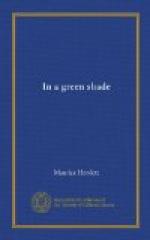Keats’ account is capital. He met the Sage between Highgate and Hampstead, he says, and “walked with him, at his alderman-after-dinner pace, for near two miles, I suppose. In those two miles he broached a thousand things. Let me see if I can give you a list—nightingales—poetry—on poetical sensation—metaphysics—different genera and species of dreams—nightmare—a dream accompanied with a sense of touch—single and double touch—a dream related—first and second consciousness—the difference explained between will and volition—so say metaphysicians from a want of smoking the second consciousness—monsters—the Kraken—mermaids—Southey believes in them—Southey’s belief too much diluted—a ghost story—Good morning—I heard his voice as he came towards me—I heard it as he moved away—I had heard it all the interval—if it may be called so.”
Charles Lamb’s is even better. On his way to the city he met Coleridge, and “in spite of my assuring him that time was precious, he drew me within the door of an unoccupied garden by the roadside, and there, sheltered from observation by a hedge of evergreens, he took me by the button of my coat, and closing his eyes, commenced an eloquent discourse, waving his right hand gently, as the musical words flowed in an unbroken stream from his lips. I listened entranced; but the striking of a church-clock recalled me to a sense of duty.” Charles cut himself free with a pen-knife, he says, and went off to his office. “Five hours afterwards, in passing the garden on my way home, I heard Coleridge’s voice, and on looking in, there he was, with closed eyes—the button in his fingers—his right hand gracefully waving.” A good story, at least. This was no company for Lady Jerningham, who demanded clarity, and probably had a good deal to do.




